近期激烈的烏俄戰爭將導致未來物價將持續攀升?
近期激烈的烏俄戰爭將導致未來物價將持續攀升?
2024年3月25日,俄羅斯發生歌劇院的恐怖攻擊事件,引發油價的迅速上漲。布倫特原油價格重返每桶86美元。此前自2024年以來,俄羅斯境內已有12家煉油廠遭受無人機襲擊,平均每日成品油產量減少8000萬升,約佔俄羅斯日均煉油產能的10%,減少55萬桶,約7萬噸左右。部分美國政治人物呼籲烏克蘭不要針對煉油廠進行攻擊,以免再次對全球經濟造成重創。
影響油價的因素有以下:
國際政治情勢:地區性的衝突、戰爭、政治不穩定或恐怖主義活動都會導致油價上漲。這些事件會干擾石油生產和供應,從而影響油價。
供求關係:供應和需求的變化是影響油價的主要因素之一。當全球經濟增長時,對能源的需求增加,油價會上漲;相反,當經濟放緩時,需求減少,油價會下跌。
生產國政策:產油國(例如俄羅斯和沙烏地阿拉伯)的政策對油價也有很大影響。這些國家可以通過增加或減少產量來調節油價,以維持他們的經濟利益。
天然災害:自然災害(如颶風、洪水或地震)可能導致石油生產設施損壞或中斷,進而對供應造成影響,導致油價波動。
貨幣匯率:油價通常以美元計價,因此匯率變化也會影響油價。如果一個國家的貨幣貶值,那麼他們需要支付更多的貨幣來購買原油,進而推高油價。
油價的波動對經濟有以下幾個影響:
通脹壓力:油價上漲會增加生產和運輸成本,進而導致商品和服務價格上漲,增加通脹壓力。
消費者支出:油價上漲可能會導致汽油價格上漲,進而降低消費者的可支配收入。這可能會減少消費者對其他商品和服務的支出,從而影響經濟增長。
能源相關行業:油價波動會對能源相關行業產生影響,如石油生產商和石油服務公司。高油價可能提高他們的利潤,而低油價可能導致投資減少和就業下降。
國際貿易平衡:石油是全球貿易的重要組成部分,因此油價波動可能會影響國際貿易平衡。出口國可能因為油價上漲而獲得更多收入,進口國則可能面臨更高的進口成本。
"Will Inflation Continue to Rise?"
On March 25, 2024, a terrorist attack at an opera house in Russia triggered a rapid increase in oil prices. The price of Brent crude oil surged back to $86 per barrel. Since 2024, a total of 12 oil refineries in Russia have been attacked by drones, resulting in a daily reduction of 80 million liters of refined oil production on average, accounting for approximately 10% of Russia's daily refining capacity of 55 million barrels, or about 70,000 metric tons. Some US politicians have urged Ukraine not to target oil refineries to avoid further devastating the global economy.
Factors affecting oil prices include:
International Political Situation: Regional conflicts, wars, political instability, or terrorist activities can lead to an increase in oil prices. These events disrupt oil production and supply, thereby affecting oil prices.
Supply and Demand: Changes in supply and demand are among the major factors influencing oil prices. When the global economy grows, the demand for energy increases, leading to higher oil prices; conversely, when the economy slows down, demand decreases, and oil prices fall.
Production Country Policies: Policies of oil-producing countries (such as Russia and Saudi Arabia) also significantly influence oil prices. These countries can adjust oil prices by increasing or decreasing production to maintain their economic interests.
Natural Disasters: Natural disasters (such as hurricanes, floods, or earthquakes) may damage or interrupt oil production facilities, affecting supply and causing oil price fluctuations.
Currency Exchange Rates: Oil prices are usually denominated in US dollars, so changes in exchange rates also affect oil prices. If a country's currency depreciates, they need to pay more currency to purchase oil, thus driving up oil prices.
The fluctuation of oil prices has several effects on the economy:
Inflation Pressure: Rising oil prices increase production and transportation costs, leading to price increases for goods and services and adding inflationary pressure.
Consumer Spending: Rising oil prices may lead to higher gasoline prices, reducing consumers' disposable income. This may reduce consumer spending on other goods and services, affecting economic growth.
Energy-related Industries: Oil price fluctuations affect energy-related industries such as oil producers and oil service companies. High oil prices may increase their profits, while low oil prices may lead to reduced investment and employment.
International Trade Balance: Oil is an essential component of global trade, so oil price fluctuations may affect international trade balances. Exporting countries may gain more income due to higher oil prices, while importing countries may face higher import costs.




照片:DALLE3
- 1
- 2
- 3
- 4
